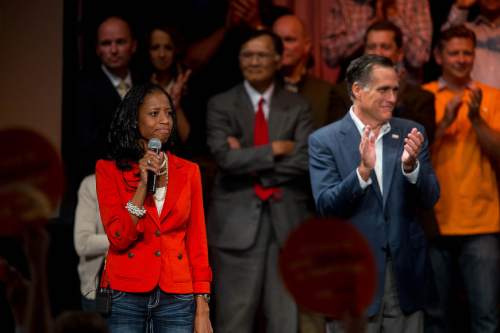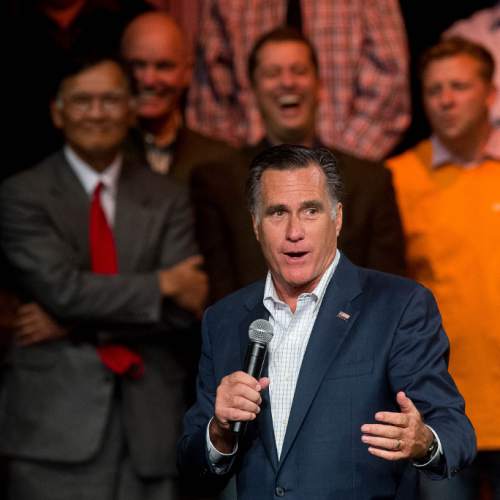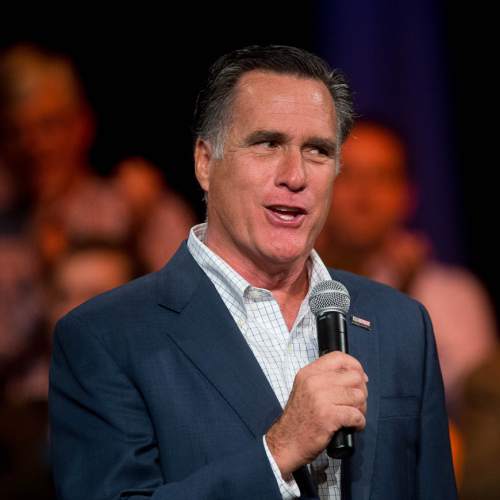This is an archived article that was published on sltrib.com in 2016, and information in the article may be outdated. It is provided only for personal research purposes and may not be reprinted.
Plan B seemed simple enough.
Before George Washington's 263rd birthday the field of Republican presidential candidates would dwindle down to a precious two — most likely moderates John Kasich and Jeb Bush. Marco Rubio would be the outlier. Donald Trump and his triple comb-over would be but a comic reminder of just how ridiculous things could have become. The mainstream would be firmly in control. Popular vote, not party bosses and brass knuckle dickering, would have shown the door to all the one-trick conservatives and sputtering demagogues.
Instead, the primary in South Carolina leaves the GOP awash in fears that the anti-establishment tsunami sweeping through both parties could carry Trump to the nomination and into the White House.
Such anxieties are premature. The numbers are on plan. Voters are collectively confirming that moderates are the base of the party of Rockefeller and Reagan. The rub is no announced candidate can win the nomination outright, which means the nominee will come by way of negotiation at the party's convention in July. The process could trigger internecine warfare the likes of which the GOP has not experienced since 1964, when doctrinaire conservatives seized control and propelled the party to its worst defeat ever.
As troubling, none of them can beat Hillary Clinton in November. She is smart, remarkably resilient, and vetted under fire at home and abroad. She has even politely endured the flailing arms and frantic rhetoric of Bernie Sanders.
This is not what Plan B anticipated.
The 2016 election was said to belong to the GOP, never mind the fact that the party has been routinely blowing them since 2008, when Sen. John McCain selected absurd Sarah Palin as his running mate. Trump is this cycle's Palin. While angry party members and independents love him (like they "Feel The Bern"), the mainstream resists. A recent poll in Utah, the most reliably Republican state in the nation, revealed that a Clinton v. Trump general election would likely be a dead heat. Presciently "Other," Utah's faceless third choice, fared just as well.
In Utah, "Other" is a placeholder for their new neighbor Willard Mitt Romney. These dreamers are not alone. In November, a Boston Globe poll claimed Romney would win New Hampshire with 36 percent of the vote were he a candidate, relegating Trump a very distant second place at 14 percent.
Will the Republican muddle persuade Romney (or attract a fresh face like the billionaire former New York City Mayor Michael Bloomberg)? Most likely, party leaders are already turning to the vetted, reasonably well-liked but always coquettish Romney.
Fully aware that some party faithful believe he is too rich, too disingenuous, too good-looking, and too Mormon likely convinced him to avoid running a third time. Yet, he coyly admits that his wife Ann favors it, despite her ongoing struggle with multiple sclerosis. Their five sons are evenly divided — two approve, two oppose and one is undecided.
The record shows that Mitt Romney craves being needed almost as much as he yearns for redemption. He was the congenial and focused young leader the founders of Bain & Company drafted to right their off-kilter partnership. Later he mounted an impressive attempt to dislodge the iconic Sen. Edward M. Kennedy. He rebounded, by rescuing squeaky clean Salt Lake City from the taint of corruption brought on by the 2002 Winter Olympic Games and graft at the highest levels of the International Olympic Committee. Then he rushed home to Boston to be redeemed by the liberal Commonwealth that had rejected him just eight years earlier.
Perhaps his newest neighbors in leafy Cottonwood and his summer friends around Lake Winnipesaukee foresaw another Romney opportunity as they sensed disarray in the party. But at this point, don't expect him to mount a floor fight at the convention. In 2008, he ducked a battle that would have secured him the vice presidential nomination that, instead, went to Palin.
Favorable polling numbers a year ago almost drew him in. His eyebrows raised again in November when the Boston Globe poll showed him trouncing everyone in New Hampshire. And he's been thinking about it ever since. His chief fund-raiser Spencer Zwick, whom Mitt regards as a sixth son, has long insisted that Romney would answer a call to unite the party. Begging and pleading could do the trick.
If redeemed, the stage will be arranged as he likes it, and just in time for the authentic moderate Romney to emerge. From the outset, that was Mitt's Plan A.
Ronald B. Scott was a reporter for the Salt Lake Tribune and the Deseret News before joining Time magazine in New York City. He is a novelist and author of a 2011 biography on Mitt Romney.







